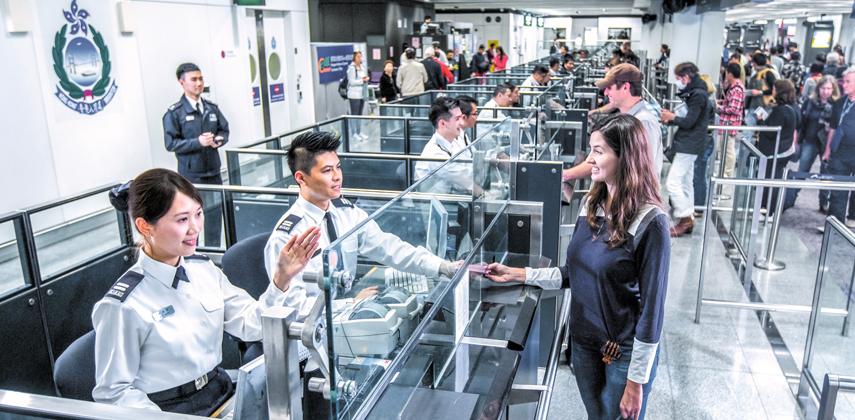Not limited to just border control, Hong Kong’s Immigration Department has many functions, including prevention and detection of immigration-related crimes, the issuing of highly secure identity cards and travel documents, and provision of efficient civil registration services for births, deaths and marriages.
In 2015, the department processed a total of 296.6 million passenger journeys and issued more than 756,000 Hong Kong passports and over 570,000 identity cards. It also detected more than 500 forged documents, instituted more than 4,600 prosecutions and prosecuted over 1,500 illegal workers – as well as almost 200 employers of illegal workers.
Those interested in joining the department as an immigration officer or immigration assistant could potentially serve in a variety of posts, explains a spokesperson from the department’s recruitment section.
Immigration officers and immigration assistants are mainly deployed on duties in connection with the enforcement of immigration, the registration of persons, and Hong Kong’s birth, death and marriage laws, which includes – but is not limited to – the detection of forged documents. Officers mainly focus on general, executive and supervisory duties, while assistants can expect to be deployed on tasks that involve search, guard, escort, patrol, reception, driving and operations.
Immigration assistants may also be required to drive government vehicles and work in areas outside Hong Kong.
Those applying to be an immigration assistant will have to undergo a physical fitness test and “syndicate discussion” on controversial issues. Applicants for the post of immigration officer will undergo a written examination in addition to a preliminary interview and fitness test. All applicants are also tested on their knowledge of the Basic Law. Selected candidates for both positions will be invited to a final interview.
For immigration assistants, the next step up is to become senior immigration assistants. Similarly, immigration officers moving up a rung become senior immigration officers.
The department recently updated the selection process for recruiting immigration officers, reducing it from five to four tiers by combining the previous two written examinations into one. Furthermore, the preliminary interview was shifted from the second selection tier to the first, shortening the whole recruitment process.
Ho Ka-wai is an immigration officer who has been based at the Lok Ma Chau Control Point for the past two years. He explains that immigration officers undergo 25 weeks of induction training. “This includes training in immigration knowledge, such as laws, policies and procedures, as well as foot drills and physical fitness training to deal with our daily work in the department,” he says. As an immigration officer, Ho has also received on-the-job training in supervising other staff.
As an immigration officer at a control point, he explains that his daily mission is to exercise effective immigration control and facilitate visits from genuine visitors.
“This is done through various tasks, such as staff deployment and supervision, further examination of passengers, and liaison with other departments.”
One of the challenges of being an immigration officer, he says, is achieving a balance between facilitation and control. “On one hand we need to facilitate the visit of genuine travellers, while on the other we have to keep out undesirables.”
One of his most rewarding experiences occurred when he encountered a patient who was sent back to hospital in Hong Kong after suffering an injury in mainland China. “Our colleagues worked as a team to provide an effective and expeditious immigration clearance to the patient and were later informed he had made a very good recovery.”
Ho believes his strong communication skills have been particularly useful in his role as an immigration officer. “Liaising [with others] constitutes a very high percentage of my duty, and smooth conversations undoubtedly enhance the effectiveness of my work.”
As he is still relatively new to the department, he feels he still has a lot to learn from his colleagues. “In the coming year, I want to get more exposure to different positions and enrich my job knowledge by cooperating with other officers,” he says. But working in the department has given him a greater understanding of the city he was born in and, as a team leader, he has gained a sense of achievement from building up a strong rapport with his co-workers.
“Effective communication is important as it ensures the team knows we share the same vision so we can accomplish our mission together,” he says, adding that he enjoys serving the community in his role as immigration officer.
This article appeared in the Classified Post print edition as Guardians at the gate.


